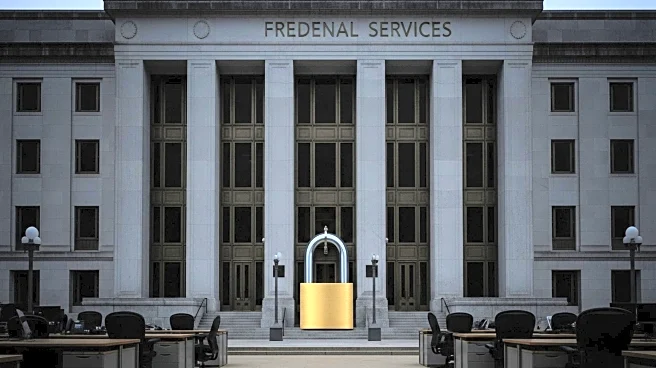What's Happening?
The U.S. government shutdown, which began on Wednesday morning, has led to the suspension of work for hundreds of thousands of federal employees, affecting a wide range of federal programs. Many employees are required to report to work without pay until funding is restored. The shutdown is a result of partisan disagreements over a $1.7 trillion funding bill, which includes allocations for various federal agencies. President Trump has threatened to fire federal employees if funding lapses, suggesting he could use the shutdown to enact measures unfavorable to Democrats. The shutdown impacts vary across departments, with some services continuing uninterrupted if they are self-funded or considered 'mandatory,' such as the Postal Service and Social Security benefits. Essential employees, including federal law enforcement officers, active-duty troops, and air traffic controllers, are required to work without pay during the shutdown.
Why It's Important?
The government shutdown has significant implications for federal services and employees, disrupting operations across various departments. The Environmental Protection Agency, Education, Commerce, and Labor are among the most affected, with high percentages of employees furloughed. The shutdown poses challenges for federal workers who must continue working without pay, potentially affecting their financial stability. It also impacts public services, as many programs are paused, leading to delays and reduced access for citizens. The political standoff over the funding bill highlights ongoing partisan tensions, with potential consequences for future legislative negotiations and public policy decisions. The shutdown underscores the vulnerability of federal operations to political disputes, affecting both government employees and the general public.
What's Next?
The resolution of the government shutdown depends on negotiations between political leaders to reach an agreement on the funding bill. If the impasse continues, federal employees may face prolonged periods without pay, increasing pressure on lawmakers to find a solution. The shutdown could lead to further political maneuvering, with President Trump potentially using the situation to push for policy changes. Stakeholders, including federal agencies, employees, and the public, will be closely monitoring developments, hoping for a swift resolution to restore normal operations. The outcome of these negotiations will likely influence future budget discussions and the stability of federal services.
Beyond the Headlines
The government shutdown raises ethical and legal questions about the treatment of federal employees, who are required to work without pay during funding lapses. It also highlights the broader implications of political disagreements on public services and the economy. The shutdown may lead to long-term shifts in how federal funding is negotiated and allocated, potentially affecting the efficiency and reliability of government operations. The situation underscores the need for more stable and predictable funding mechanisms to prevent disruptions in essential services.









